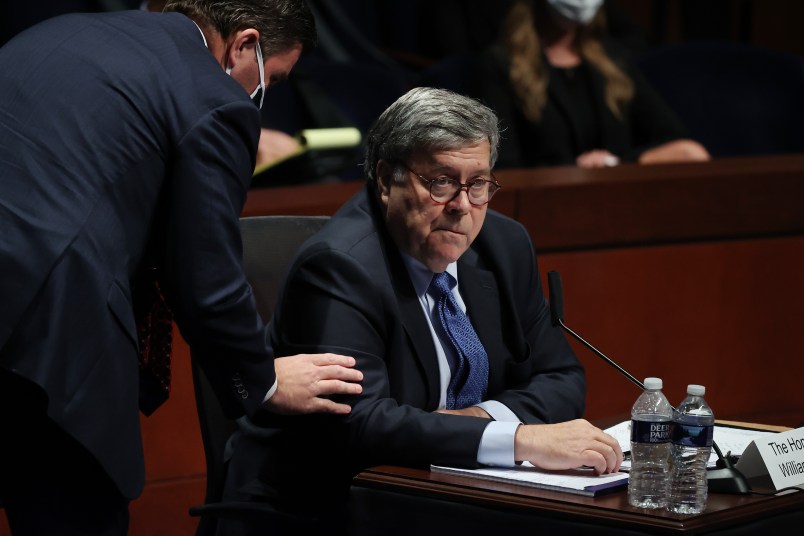The Justice Department on Monday told the House Judiciary Committee that several high-profile witnesses would not testify as requested because legislators had been rude to Attorney General Bill Barr.
The Judiciary Committee in recent weeks had requested testimony from the directors of the Bureau of Prisons and the U.S. Marshals Service, as well as from the assistant attorney general leading the DOJ’s Civil Rights Division, Eric Dreiband. Writing in response to Committee Chairman Jerry Nadler (D-NY) on Monday, Assistant Attorney General Stephen Boyd’s letter might as well have been one word: No.
Instead, Boyd wrote at length about the indignities the attorney general experienced during his July 28 appearance before the committee, when Boyd said members of Congress chose “to use their allotted time to air grievances.”
“Rather than attempt to obtain information from the Department that would assist the Committee in recommending legislation to the House, many members of the majority devoted their time entirely towards scolding and insulting the Attorney General,” Boyd wrote.
Spokespeople for Nadler didn’t respond to TPM’s request for comment on the snub.
Boyd took issue with Democrats’ interruptions of Barr, and their repeated use of the phrase “reclaiming my time” in order to cut him off. The letter singled out Rep. Hank Johnson (D-GA), though not by name, who at one point during his questioning of Barr told him “I don’t want you to tell your story” as Barr began to explain a position of his.
It’s true that Democrats’ questions to Barr were often heavy on monologuing and riddled with “isn’t it true”-type questions.
But singling out Johnson was an odd choice. The back-and-forth between Barr and the congressman produced one of Barr’s more memorable quotes of the day: “Let me ask you: Do you think it is fair for a 67-year-old man to be sent to prison for 7-9 years?” he said, defending his decision to intervene in the sentencing of Trump confidante Roger Stone in order to recommend a less prison time.
It was an unintentionally revealing moment. Thousands of elderly people are currently incarcerated and serving lengthy sentences. But Barr intervened in the case of a close and strategic ally of the President. (Trump commuted Stone’s sentence in July.) Multiple prosecutors quit the Stone case, and one left the Justice Department entirely, after Barr’s intervention. Judge Amy Berman Jackson, during Stone’s sentencing, referred to the “unprecedented actions of the Department of Justice in the past week.” And the department’s inspector general is currently investigating the decisions behind the Stone sentencing recommendation.
But according to Boyd, the department just wasn’t satisfied with the day’s questions.
“We very much regret that the Committee did not elect to engage in a meaningful, good-faith effort to obtain information and views from the Attorney General while he was present and prepared to testify,” he wrote.
“Having squandered its opportunity to conduct a meaningful oversight hearing with the Attorney General, it remains unclear how further public spectacles with other Department officials would now — a mere 14 legislative days since the Attorney General’s hearing — advance the Committee’s legitimate oversight efforts.”



